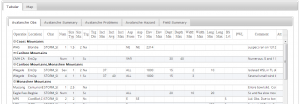Difference between revisions of "Single page view versus individual tabs for tables"
Jump to navigation
Jump to search
(→Related documents) |
(→Functionality tested by) |
||
| Line 57: | Line 57: | ||
==Functionality tested by== | ==Functionality tested by== | ||
| − | * | + | * Jan. 1, 2014: Pascal Haegeli |
| − | |||
[[Category:Super User]][[Category:Operation Administrator]][[Category:Submission Moderator]][[Category:User]] | [[Category:Super User]][[Category:Operation Administrator]][[Category:Submission Moderator]][[Category:User]] | ||
| − | [[Category:Reports]] | + | [[Category:Reports]][[Category:Version 3.4.0]] |
| − | [[Category:Version | ||
Revision as of 17:46, 1 January 2014
| REQUIREMENTS | |
| Permission | All user levels |
| Connectivity | Online only |
This page describes basic layout options for the presentation of report information.
Background
Reports can be presented to viewers two ways.
The following information assumes you are logged in to the InfoEx application, you have selected an operation (if you have more than one valid operation) and you have selected 'Reports' on the main application menu.
Step-by-step-description
| 1. | To access the layout options select the 'settings' icon on the upper right of the 'Reports' page (fig. 1). | ||||
| 2. | A dropdown box will appear offering selections for the layout, grouping, and table types for the report that will be produced (Fig.2). For a description of selecting tables and grouping options see: Specifying the tables to be included in an InfoEx report and Grouping of observations within tables. | ||||
| 3. | Under 'Layout' select the layout option that you prefer.
| ||||
| 4. | The format for the custom report that you have created by arranging the tables can be saved for future use. See: Saving a report as an InfoEx report template |
Related documents
Customizing reports
- Content
- Layout
Managing report templates
- Saving a report as an InfoEx report template
- Modifying an existing InfoEx report template
- Deleting an existing InfoEx report template
- Signing up for the daily InfoEx report emails
Functionality tested by
- Jan. 1, 2014: Pascal Haegeli


